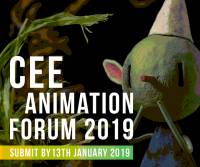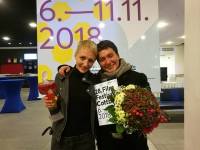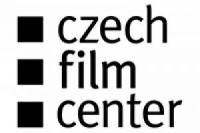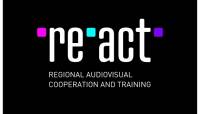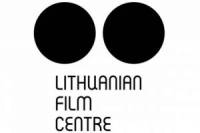Visegrad Animation Forum Is Rebranding into CEE Animation and Opens Call for Pitch of Animated Projects
Press releases 13-11-2018Visegrad Animation Forum (VAF) has been the largest platform for the animation industry in Central and Eastern Europe. Over the course of its six-year existence, it has managed to build a strong base of film professionals and welcome over 150 participants from all over Europe in Třeboň every year. The Central and Eastern European region operates on very similar historical, artistic and economic fundaments. That's why it is the organisers' ambition to broaden the platform by including other countries, increase the range of activities, and umbrella all of that under the new CEE Animation brand.
CEE Animation Forum
formerly known as VAF Třeboň
From 6th to 9th May 2019, a traditional pitching competition of animation projects will be held in three categories: short film, series / TV special or feature film. Selected authors will have a unique opportunity to consult projects with invited experts, get valuable feedback and advice on how to improve their presentation, script, or production strategy. Competition participants can secure a chance to find a co-production partner by presenting it in front of more than one hundred film professionals - including producers, TV programmers, festival directors, distributors, investors or representatives of national film funds. They all come to Třeboň to meet new creativity, discuss new visions and opportunities or talk about financing methods and strategies for further development of the field. During those three days, great emphasis is placed on networking in the form of 1: 1 meetings or short presentations of countries and studios. The Forum is organised in collaboration with Anifilm International Festival of Animated Films.
Sign up your project by filling in the online form by 13th January 2019 the latest.
For detailed rules of the competition, go HERE.
CEE Animation Workshop
This year CEE Animation is offering a new opportunity to film professionals: a training programme designed to develop projects and create production networks. The goal is to provide participants with training in the field of development, from the work on script to artistic and production counselling. Particular attention will be paid to the conditions of production in the countries of this region. The CEE Animation Workshop is divided into three six-day modules. The first one will focus on development (Ljubljana, December 2018), the second on production and financing (Budapest, March 2019) and the third one on market access. The last module will take place before the CEE Animation Forum in Třeboň.
CEE Animation Talents
formerly known as VAF New Talents
Every year, animation of the Central and Eastern Europe region brings young gifted creators to global cinematography. It is precisely for these debutants that the CEE Animation Talents selection is made each year to promote exceptional short films at leading animation markets, festivals or with foreign producers. This way, successful titles such as Happy End (Jan Saska, CZ), Farewell (Leon Vidmar, SI), Volcano Island (Anna Katalin Lovrity, HU), Cowboyland (Dávid Štumpf, SK) or The Fruits of Clouds (Kateřina Karhánková, CZ) have appeared in the programmes of European festivals in recent years.
CEE Animation
The joint effort of the CEE Animation platform is to improve the interconnection of Central and Eastern European countries, establish an effective communication network among all players in the animation industry and create suitable conditions for international co-productions. Another piece into the puzzle of success is opening up a discussion with public service televisions and film funds of the region. At present, it's the public service televisions that do not allow standard co-production of new TV series. The set of measures and the design of the strategy for future years are being prepared within a comprehensive document called "Ljubljana Accord", a response to the European Animation Plan. Publication of the text is expected at the end of 2019.
Awarded feature film BILLE awaits its international premiere in the largest Northern European Film Festival
Press releases 13-11-2018After winning the Latvian National Film Award “Lielais Kristaps” for the Best Feature just yesterday, the compelling family drama BILLE (dir. Ināra Kolmane), a co-production of Film Studio DEVIŅI (Latvia), Masterfilm and Magiclab (Czech Republic), and Studio 2 (Lithuania) is getting ready for its international premiere on November 27 as part of the Baltic Film Competition of the international Tallinn Black Nights Film Festival.
Having outplayed Hollywood blockbusters after its first weeks in Latvian cinemas and earned nothing but praises from 50 000 viewers so far, family drama “Bille” is ready to hit the screens worldwide. The international premiere on November 27 is a highly anticipated event and it is important to know that the title is up for grabs as the search for the international distributor is still ongoing.
BILLE is a bestselling autobiographical novel reborn as a feature. Its screenplay is based on the first novel of trilogy “Bille” by the famous Latvian author Vizma Belševica, a winner of Tomas Tranströmer Award and candidate for the Nobel Prize. The remarkable success of her autobiographical novel “Bille” in Latvia, Sweden and beyond was the cause of the author being considered for the Nobel Prize in Literature and the Swedish population listing her as a very likely winner. BILLE is a poignant yet very inspiring story. Confronted by the contradictory and confusing adult world and her nervous mother's contempt for her, Bille tries to find an escape in her vivid imagination and look for the Wonderland. Growing up in the late 1930s poor working class family, she has many struggles ahead of her but eventually she finds the right way and proves that dreams may come true. Despite being set in 1930s, the issues addressed in this feature are still relevant nowadays. Through masterful camerawork and intelligent directing technique, the spectator is able to enter the mind of a child and see the world through the innocent child’s eyes. Light (natural and VFX-created) serves as a narrative device that highlights the most transformative moments in life of the protagonist who eventually finds the light in the end of the tunnel full of disappointments and illusions.
Furthermore, BILLE is a story about women made by women. Mother-daughter relationships are very individual yet very relatable for everyone. The first viewers claimed they saw their own childhood episodes flash before their eyes while watching this movie. The touching story is brought to life by the world-renowned director Ināra Kolmane projecting sorrows and excitement of childhood to the big screen in a visually powerful manner. Filmed in the actual apartment the author spent her childhood in, the viewer is teleported back to 1930s and learns about her life in the most authentic way possible. The first-time actress Rūta Kronberga delivers an unforgettable experience admired by numerous experts and screenplay consultants while the experienced actresses in roles of Bille’s Mother and Grandmother form a gritty background fueling the narrative. We can confidently say BILLE falls within the category of modern cinema that contain engaging storyline, detailed and sensitive filmmaking, a strong child lead and a diverse team of women in cast and crew.
Apart from being selected by the top A class film festival in the region Tallinn Black Nights, BILLE has also won the Best Feature 2018 and earned eight nominations at the Latvian National Film Festival “Lielais Kristaps” (The Great Kristaps).
The core of the film crew consists of Screenplay Writers Evita Sniedze and Arvis Kolmanis, Director Ināra Kolmane, Director of Photography Jurģis Kmins, Producers Jānis Juhņēvičs, Marta Romanova-Jēkabsone, Co-producers Kestutis Petrulis, Arunas Stoskus, Michal Krecek, Dagmar Sedlackova, Executive Producer Marta Mannenbach and Associated Producer Andrea Shaffer, Editor Michal Lansky and Anna Johnson Ryndová, and Sound Director Arturas Pugaciauskas. The author of music is the internationally recognized composer Pēteris Vasks. The leading role of Bille is played by Rūta Kronberga, Elīna Vāne stars as Bille’s Mother; the role of Father is portrayed by Artūrs Skrastiņš while the role of Grandmother is mastered by Lolita Cauka.
The production was financed by the Culture Ministry of the Republic of Latvia, the National Film Center state programme “Latvian films for Latvia’s Centennial”, the Czech Film Fund and the National Film Centre of Lithuania and is dedicated to the Centenary of the Republic of Latvia this year. The local distributor of the film is Forum Cinemas/Uz Kino in Latvia.
Contact person:
Marta Mannenbach
Executive Producer
This email address is being protected from spambots. You need JavaScript enabled to view it.
+1 415-574-0082
www.devini.lv
Bulgarian feature film "IRINA" by Nadejda Koseva won top awards in Minsk, Tirana and Cottbus
Press releases 13-11-2018“IRINA” triumphed on the stage of three important international film festivals last week.
The film was included in the 25th Minsk Film Festival main competition. The screening was a huge success, making the film one of the favourites’ for the audience award.
“IRINA” received the Grand Prix “Golden Owl” for Best feature film at the 16th Tirana Film Festival. The Jury motivation emphasized on the “strong story about survival in unpleasant surroundings through female character that shows how we can forgive and find the hope at the end”. The throfy was presented to producer of the film Stefan Kitanov.
The film also achieved success at the 28th Cottbus Film Festival in Germany and won two more awards - Best actress for Martina Apostolova and Best debut for the director Nadejda Koseva who both in person received the prizes.
“IRINA” tells a story of a young woman who lives in a small mining town. She needs to save her family from the poverty so her decision is to become a surrogate mother, carrying some strangers’ child for money. In time Irina will discover what means to love and to forgive…
Presented as a project at SOFIA MEETINGS, “IRINA” was developed with the support of MEDIA Programme of the EU, SEE Cinema Network, ScripTeast and the Bulgarian National Film Center. The film is an Art Fest Production, in co-production with Front Film, Doli Media Studio and Right Solutions, with the support of Bulgarian National Film Center.
The cast of “IRINA” includes Martina Apostolova, Hristo Ushev, Irini Jambonas, Kasiel Noah Asher, Alexander Kossev, Krassimir Dokov. The script was written by Svetoslav Ovcharov, Bojan Vuletic and Nadejda Koseva. DOP is Kiril Prodanov, art director - Ivelina Mineva, costume designer - Viktor Andreev, make-up artist - Petya Simeonova, editor - Nina Altaparmakova, music - Petar Dundakov, sound recordist and mixer - Momchil Bojkov. Co-producers - Svetla Tsotsorkova, Dobromir Chochov, Todor G. Todorov. Producer - Stefan Kitanov. International sales agent is the French company Alpha Violet. The international promotion is supported by “Mobility” Programme of the National Culture Fund, Bulgaria.
LUX Film Prize finalists’ plea to EU decision makers: audiovisual creators should be linked to the life of their works
Press releases 13-11-2018On the occasion of the European Parliament LUX Film Prize Award Ceremony on 14 November, LUX Prize finalists since 2007 are calling in an open letter on Member States and the European Commission to take on board the Parliament’s proposal to introduce a principle of fair and proportionate remuneration for authors and performers in the proposed Directive on Copyright in the Digital Single Market.
The LUX Film Prize is a unique platform for European filmmakers’ works to reach European audiences at large by providing visibility and subtitles in the EU official languages. In order to foster a vibrant creative environment at a time when the online exploitation of audiovisual works is increasing, European filmmakers are calling on EU institutions to support them in finally sharing in the economic success of their work.
Following the adoption of the European Parliament’s position on the proposed Directive on Copyright in the Digital Single Market on 12 September, interinstitutional negotiations have started, with the objective of reaching an agreement by the end of the year. The European Parliament proposed to introduce a much-needed principle of fair and proportionate remuneration for authors and performers, leaving flexibility to Member States on the choice of the implementation instrument (collective bargaining agreements, collective management of rights, statutory remuneration mechanisms) provided that authors and performers receive remuneration from the revenues derived from the exploitation of their works.
Quotes
“Representative organisations of screenwriters and directors have asked for it, more than 21,000 petition signatories support it, The European Parliament proposed it and now we, the finalists of the LUX Film Prize, call for it. It is time that the Commission and Council listen and re-balance the level playing-field to include authors in the ecosystem of the exploitation of their works”, said Benedikt Erlingsson, Wolfgang Fischer and Mila Turajlic, the LUX Film Prize finalists of 2018.
“The LUX Film Prize pays tribute to the unique diversity and quality of European cinema. Fostering European audiovisual authors’ creative freedom entails enabling them to make a sustainable living, and therefore to benefit from the success of their works.”, said Pauline Durand-Vialle, FERA Chief Executive.
“Collections of royalties for audiovisual authors represent 6,4% according to the CISAC Global Report. Collections for digital rights only amount to 2,4% of this total. Including a principle of fair and proportionate remuneration in the new Directive on Copyright is essential for authors to fairly benefit from the success of their works, in relation to the actual distribution and consumption of film and TV”, said Cécile Despringre, SAA Executive Director.
Narva Creative Incubator OBJEKT introduces this year at Black Nights Film Festival and Industry@Tallinn &; Baltic Event a new audiovisual media development programme, TV Beats, with the aim to grow the TV production ecosystem in the Baltic region.
TV Beats continues to develop a program dedicated to TV series, which presented three new international series to festival audiences last year. This year’s project gives TV Beats a brand new dimension, as it aims to facilitate the growth of the local TV production ecosystem.
In the framework of the programme, TV Beats Forum will take place before the official start of Industry@Tallinn &; Baltic Event on November 23rd, 2018, where world-class TV producers from Great Britain, Finland and Russia will share their valuable experience. Participants will be given the opportunity to learn how the best formats are found, produced, and channelled and to discuss the main principles of building a successful TV production industry ecosystem.
"The TV Beats programme aims to highlight the increasingly blurred borders between the small and big screens. The development program and the forum contribute to the growth of essential industry competence on the ground; and Estonia could become a place for co-production of TV series and other formats in the future," explained Tiina Lokk, Director of the Black Nights Film Festival, regarding the future plans for the programme.
The programme started with IdeaLabs in Narva and Tallinn last week, gathering video bloggers and TV producers, as well other audiovisual media professionals and enthusiasts to discover new formats, technologies, business models, and to develop the industry network. Hackathon, the next step after IdeaLabs takes place in Narva between December 7th and 9th. Organisers have chosen the following areas where fresh ideas are sought: TV production, vlogging, VR and AR, visual effects and animation. After the hackathon, the best teams will have a chance to take part in the pre-acceleration and present their demo to potential investors at @sTARTUpday in Tartu on January 24th, 2019.
TV Beats is organised with the help of Europe's most experienced B2B accelerator, Startup Wise Guys. “Hackathons are a great birthplace of talented startup teams, as it can be seen from the example of Garage48 and many of our portfolio startups. But making it for real, and big, after the initial 48h of fun and sweat requires immediate work, and the guidance of experienced mentors. This is the exciting side of the TV Beats program – it follows an idea from the start to pre-acceleration,“ says Farid Singh, Startup Wise Guys Program Lead.
Speaking about the organisers' expectations, Jana Pavlenkova, Managing Director of the Narva Creative Incubator OBJEKT, explains: "We are welcoming people who are already active in the industry, but also those who are still making their first steps in the area of audiovisual media and TV production, and need a professional boost. In addition, participation in TV Beats gives you the opportunity to create new acquaintances in the TV industry and be part of the PÖFF and Industry@Tallinn &; Baltic Event network."
The 22nd Black Night Film Festival runs from the 16th of November until the 2nd of December.
The TV Beats programme is financed from the European Regional Development Fund via Enterprise Estonia (EAS) through the project EU51523.
These are the production and development grants announced by the Estonian Film Institute between April 2018 and October 2018.
The International Documentary Film Festival Amsterdam is the largest and most important showcase of documentary films in the world. This year’s 31st instalment will host Czech director Helena Třeštíková as a guest of honor, screening a retrospective of her work and ten of the films that most influenced her career, among them works by Věra Chytilová and Miloš Forman. The Czech documentary When the War Comes by director Jan Gebert has also been selected for the festival, where the Czech Film Center will also be in attendance as an industry program partner.
The festival will recognize Helena Třeštíková’s career of more than 40 years, over which time she honed her unique style of “longitudinal documentaries” – long-term projects revealing the personal transformations of their protagonists over huge spans of time. Over the course of those years the director has garnered numerous awards, including a “European Oscar” in 2008 for the documentary René. The festival will present a retrospective of six of her films including Katka, Mallory, the aforementioned René and the popular Marriage Studies, as well as the director’s first film, The Miracle, from 1975, and her study of the actress Lída Baarová,Doomed Beauty. Audiences can engage with the director herself in the Filmmaker Talks and elsewhere at the festival, where she will be presenting the ten works of cinematography that most impacted her own filmmaking, half of which are Czech films. Amsterdam attendees will thus have a chance to see Miloš Forman’s The Firemen’s Ball, Věra Chytilová’s Something Different and Prague: The Restless Heart of Europe, Citizen Havel by Pavel Koutecký and Miroslav Janek and 66 Seasons by Peter Kerekes.
Director Jan Gebert’s documentary When the War Comes has been included in the Best of Fests category – a selection of the best films screened at international festivals this year. The film observes the topical trend of youth paramilitary organizations in Europe and takes a close look at the issue of crowd manipulation. The documentary’s main character is a seemingly ordinary Slovak college student preparing himself for a career in politics as the self-appointed chief of a hundreds-strong private militia. The documentary was made with the backing of the Czech Film Fund which provided a production grant of 1.5 million Czech crowns. Gebert’s breakthrough at the festival is of particular note as the organizers decreased the number of films this year to less than 300, meaning no more than 12 films in each competitive category.
The Czech Film Fund will also be in attendance at the festival, where it will be organizing the Guests Meet Guests event for film industry professionals at 6 pm on Tuesday, November 20, in the Zuidekerk area of Amsterdam’s historical city center. "IDFA is the world’s premiere event for documentary filmmaking, so it is the ideal place to promote national cinematography among the key players in the film industry who are deciding which films are going to be successful," says Markéta Šantrochová, head of the Czech Film Center department.
The International Documentary Film Festival Amsterdam will be underway from November 14th to 25th
It’s that time of the year again, the nights are long and dark. And, that can only means one thing, it’s time to head to the cinema because Tallinn Black Nights Film Festival has started. It’s an internationally known rule: when the Black Nights Film Festival kicks off, Industry@Tallinn will soon follow.
The Festival + Industry Badge gives you the right to claim a single ticket (valid with badge) for any of the screenings of the festival's main programme, Just Film and PÖFF Shorts, when there are vacant seats. You can claim four tickets a day, with a maximum of 40 tickets. You also have the right to enter the festival's screenings without a ticket, however, not more than 5 minutes before the screening starts and when there are vacant seats. And of course, it reserves you access to Industry@Tallinn &; Baltic Event 2018.
We also recommend joining the Wolf Pack, a brand new loyalty programme initiated this year. For more information how to find you pack, click here.
See you at PÖFF, 22nd Tallinn Black Nights Film Festival! In the meantime, we will keep you updated on what's happening this week, before the official start of Industry@Tallinn &; Baltic Event on November 26.
For full programme click HERE.
RE-ACT Co-Development Funding scheme supports a maximum of 6 projects with a minimum financial support of 10.000 Euros per project per year. The Programme Council appointed by three member funds reads and evaluates the projects in collaboration with external experts.
The recipients of RE-ACT co-development funding for the year 2018 will be announced in January 2019 during the When East Meets West Co-production Forum in Trieste, Italy.
New deadline for application is 19 November 2018.
For guidelines, eligibility criteria and application form visit www.filmreact.eu.
World Premiere of Ernestas Jankauskas’ Sasha Was Here to Crown Lithuanian Programme at Tallinn Film Festival
Press releases 19-11-2018Tallinn Black Nights Film Festival (or PÖFF), the biggest international film event in the Baltics, kicks off today. This year, the A class festival is exceptionally rich in Lithuanian offerings: as the Baltic states are celebrating the centenary of their statehood, PÖFF features the biggest programme of Lithuanian cinema in the festival’s history along with two Lithuanian films to have their world premieres in Tallinn.
New Lithuanian-produced or co-produced features, documentaries, shorts and a restored classic film will screen in the festival’s competition and non-competitive sections and will be presented by a big delegation of filmmakers. Lithuanian film industry professionals will also present their projects at PÖFF’s annual industry events. Delegates of the Lithuanian Film Centre will acquaint the international film community with the results and future outlook of the government’s tax incentive for film production in Lithuania.
PÖFF’s competitive programme First Feature Competition, showcasing debut features representing youthful vivacity, questing ideas and unexpected viewpoints, will include the world premiere of Ernestas Jankauskas’ Sasha Was Here (production company Dansu Films). The film will compete with 18 other works from over 20 countries across Europe and the world, including Morocco, India, Iran, Mexico, Canada and Japan. Sasha Was Here will be presented by the film’s director Jankauskas, producers Gabija Siurbytė and Rūta Petronytė, scriptwriter Birutė Kapustinskaitė, cast members Valentin Novopolskij and Markas Eimontas.
After a seven-year break, this year’s PÖFF returns with the Baltic Film Competition. Of the 11 fiction films, documentaries and animations in the programme, seven have been produced or co-produced by Lithuanian production companies.
Among them are Edita Kabaraitė’s documentary 100 Years Together and Audrius Stonys’ and Kristīne Briede’s Bridges of Time which has recently won the Best Documentary award at the Latvian national film awards. The Baltic Film Competition also includes three Lithuanian feature films: Marija Kavtaradzė’s road movie Summer Survivors, Giedrė Beinoriūtė’s drama Breathing into Marble and Marius A. Markevičius’ Ashes in the Snow.
Lithuanian filmmakers have also been involved in the minority co-production of several other films presented in PÖFF’s Baltic Film Competition: Bille (directed by Ināra Kolmane, Latvia, Lithuania, Czech Republic), a family film that has received the Best Film award in Latvia, and Foam at the Mouth (Latvia, Lithuania, Poland), directed by Latvian filmmaker Jānis Nords.
This year’s PÖFF competition programmes also feature Lithuanian jury members. The composer Martynas Bialobžeskis, who last year received the festival’s prize for the score he composed for the Estonian-Lithuanian co-production The Man Slayer. The Virgin. The Shadow (directed by Sulev Keedus), has been invited to judge films in the Official Selection. Meanwhile Lina Užkuraitytė, the director of International Vilnius Film Festival for Children and Youth, will be a member of the ECFA jury to award the Best Children’s Film at Tallinn Black Nights sub-festival Just Film.
PÖFF non-competitive programmes will also be rich in Lithuanian offerings. In Focus: 100-Year-Olds, showcasing the Baltic nations’ film heritage on the occasion of their statehood centenary, will feature one of the best works of classical Lithuanian cinema, Arūnas Žebriūnas’ The Beauty (1969). The film, whose restoration and digitisation was commissioned by the Lithuanian Film Centre, will be presented by the film historian Lina Kaminskaitė-Jančorienė.
The non-competitive programme Panorama, made up of a broad selection of internationally recognised films, will screen minority co-production Core of the World (Russia, Lithuania) directed by well-known Russian filmmaker Natalia Meshchaninova.
PÖFF Shorts, a sub-festival for short and animated films running on November 20–28, collects some of the best new shorts by Lithuanian young-generation filmmakers. The special programme Baltic 100: Lithuanian Stories includes By the Pool directed by Laurynas Bareiša, Snake directed by Titas Laucius, The Last Day directed by Klaudija Matvejevaitė, The Mother’s Day directed by Kamilė Milašiūtė, and Watchkeeping directed by Karolis Kaupinis.
Another programme DOC@Shorts includes the world premiere of Ričardas Matačius’ short documentary Nest. A Movie About Two People and Two Birds. The film will be presented by the producer Urtė Aškelovičiūtė (Incubus Films) and cinematographer Adomas Jablonskis.
PÖFF’s 17th Baltic Event Co-production Market, running on November 27–30, has selected 16 feature film projects in development. Among them is Ernestas Jankauskas’ Oxygen (produced by Dansu Films). The intense four-day Co-production Market will allow filmmakers to present their projects to potential supporters, co-producers and sales agents. The best project will receive Eurimages Co-Production Development Award of 20 000 Euros.
Films in production from the Baltic region and Finland will be presented in the Baltic Event Works in Progress programme. The annual event, launched in 2003, this year will include Marat Sargsyan’s feature The Flood Won’t Come (produced by Tremora) and Latvian-Czech-Lithuanian co-production City on the River (directed by Viesturs Kairišs).
Jorė Janavičiūtė will present her short film On Time at Baltic Preview, a networking event for professionals within the framework of PÖFF Shorts.
The Lithuanian Film Centre is an official partner of Baltic Event, also partially supporting the participation of Lithuanian film industry professionals at Tallinn Black Nights Film Festival.
.

